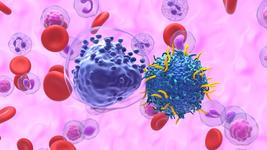CRISPR Clinical Trial Updates From Caribou Biosciences
CMN Intelligence - The World’s Most Comprehensive Intelligence Platform for CRISPR-Genomic Medicine and Gene-Editing Clinical Development
Providing market intelligence, data infrastructure, analytics, and reporting services for the global gene-editing sector. Read more...
It's been a busy few weeks for Berkeley spinout Caribou Biosciences, which now has two gene-edited programmes in the clinic. The company is leveraging its next-generation Cas12a chRDNA (CRISPR hybrid RNA-DNA) technology to perform genome edits with a higher degree of precision than first-generation CRISPR-Cas systems.
First patient dosed in CaMMouflage Phase 1 Trial of CB-011
Late last month, the company announced that the first patient had been dosed in the CaMMouflage Phase 1 Trial of CB-011, an allogeneic anti-BCMA CAR-T cell therapy. CB-011 is being developed for the treatment of relapsed or refractory multiple myeloma (r/r MM) and is the second candidate from Caribou's pipeline to enter the clinic.
CB-011 is a gene-edited CAR-T cell therapy generated from healthy donor cells, which is designed to improve anti-tumour activity by reducing immune rejection. According to the company's press release, the first patient to be dosed with CB-011 received an intravenous dose of 50x106 CAR-T cells (dose level 1).
To generate CB-011, Caribou Biosciences uses its Cas12a chRDNA technology to site-specifically insert a proprietary new humanised anti-BCMA CAR into the T cell genome of healthy donor T cells. BCMA or B-cell maturation antigen is found on the cell surface in nearly all cases of MM, but exhibits limited expression on normal tissues besides plasma cells, making it an excellent therapeutic target for MM.
Cas12a chRDNA is also used to remove the endogenous beta-2 microglobulin (B2M) protein and insert a B2M–human-leukocyte-antigen-E–peptide (B2M–HLA-E) transgene into the donor cells. This strategy, which the company refers to as immune cloaking, should improve the anti-tumour activity of CB-011 by reducing CAR-T cell rejection mediated by both the patient’s T cells and natural killer (NK) cells.
Yesterday, the company announced that the FDA has granted a Track Designation to CB-011 for the treatment of r/r MM. The FDA's Fast Track process is designed to facilitate the development and speed up the review of certain drugs to treat serious conditions and fill unmet medical needs.
Caribou plans to continue to enrol additional patients at dose level 1 in the CaMMouflage trial and provide an update on the clearance of dose levels as appropriate.
Dose Expansion Initiated in ANTLER Phase 1 Trial of CB-010
Caribou also announced late last month that it will initiate the dose expansion portion of its ongoing CB-010 ANTLER Phase 1 trial in second-line large B cell lymphoma patients. CB-010 is a CRISPR-edited anti-CD19 allogeneic CAR-T cell therapy being evaluated in patients with relapsed or refractory B cell non-Hodgkin lymphoma.
CB-010 is Caribou’s most advanced cell therapy candidate and is derived from healthy donor T cells that are edited using the Cas9 chRDNA technology. Specifically, a CD19-specific CAR is inserted into the TRAC gene, which encodes the T cell receptor alpha constant. The PD-1 gene is also deleted in these cells. This gene encodes the PD-1 protein that functions as a safety switch on T cells that cancer cells turn on to protect themselves from T cell-mediated immune responses. CB-010 was the first allogeneic CAR-T cell therapy with a CRISPR-mediated PD-1 deletion to be cleared for a clinical trial.
CB-010 was well tolerated at all 3 dose levels evaluated in a recently completed dose escalation portion of the ANTLER trial, which you can read about in a previous clinical trial update here.
According the company’s press release, Caribou plans to evaluate 2 different dose levels of CB-010 In the dose expansion portion of the ANTLER trial. Each dose will evaluated as a single-dose regimen, in approximately 30 total second-line patients (approximately 15 patients per dose level) to determine the recommended Phase 2 dose. Once this has been determined, Caribou may enrol additional patients, including patients who have failed prior CD19-targeted therapies. The company expects that the collective data from ANTLER will inform a potential pivotal trial plan. The next update on the ANTLER trial is expected in the second half of 2023, and will include safety and efficacy data from at least 15 patients from dose escalation with a minimum of 6 months of follow up.
You can read more about Caribou's approach to therapeutic genome editing in our recent interview with CSO Steve Kanner Ph.D. here.
For a complete overview of CRISPR IND approvals and ongoing gene-editing clinical trials, check out CRISPR Medicine News' Clinical Trials Database.
To get more of the CRISPR Medicine News delivered to your inbox, sign up to the free weekly CMN Newsletter here.
Tags
ArticleNewsClinical News UpdatesCancerMultiple Myeloma, MMCaribou Biosciences, Inc.
CLINICAL TRIALS
Sponsors:
Base Therapeutics (Shanghai) Co., Ltd.
Sponsors:
Base Therapeutics (Shanghai) Co., Ltd.







